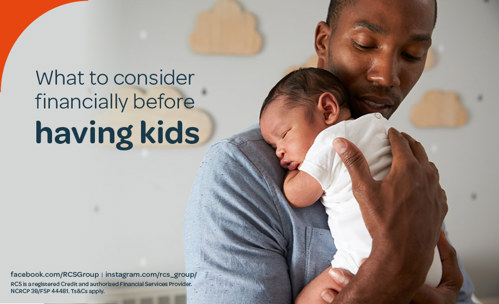What to consider financially before having kids
14 AUGUST 2023
There are plenty of moments where you’ll have to wing it as a parent, but these are the big costs you really should plan for. This just in: global statistics show us that people are having fewer kids because... it's expensive. According to a poll conducted for The New York Times which asked Americans why they’re having fewer children, concerns such as the cost of childcare, not enough paid family leave and financial instability took the top spots. This could apply to any parent in any part of the world. To help you feel more prepared, we’ve listed five big-ticket expenses to help you prepare financially for having kids.
This just in: global statistics show us that people are having fewer kids because... it's expensive. According to a poll conducted for The New York Times which asked Americans why they’re having fewer children, concerns such as the cost of childcare, not enough paid family leave and financial instability took the top spots. This could apply to any parent in any part of the world. To help you feel more prepared, we’ve listed five big-ticket expenses to help you prepare financially for having kids.
MEDICAL COSTS
Even if you adopt the trendy “back-to-basics” approach to pregnancy and birth, there’s little you can do if you end up needing medical intervention. Medical aid and gap cover can help you cover the costs of essential scans, medication, hospital care and post-birth check-ups. Just remember, gap cover will only kick in after a year so sign up well in advance. If you have existing medical cover, you’ll need to add your baby to the policy which will increase your monthly payment.
LIFE INSURANCE
Having a kid means someone is now dependent on you, so it’s a really good idea to have life and disability insurance. At the same time make sure you have a will and keep it updated. If the worst happens, you will want your family to be looked after.
ESSENTIAL BABY GEAR
Yes, there are lots of things that are nice-to-haves, and plenty of items that don’t really lull your baby into a peaceful sleep despite the 118 reviews saying they would. But there are some things you simply have to have: a good quality car seat, an easy-to-operate pram, a cot and some sort of baby carrier. Then consider recurring costs such as nappies, wet wipes, formula, food and clothes.
CHILDCARE AND SCHOOLING
This is a biggie. If you’re heading back to work, you’ll need to budget for full-time childcare. Then, before you know it, your little one is heading off to preschool and then putting on a uniform for big school. Besides school fees, there are ongoing costs such as outings, extra murals, sports gear and more. Try and put away a little bit of money each month to help you cover these expenses when they come up. Learn how to save for your child education.
SAVING FOR THEIR FUTURE
It’s a big responsibility adding a new member to the family. When you find your feet as a new parent think about setting up a tax-free savings account or similar to start saving for your child’s tertiary education and beyond.



